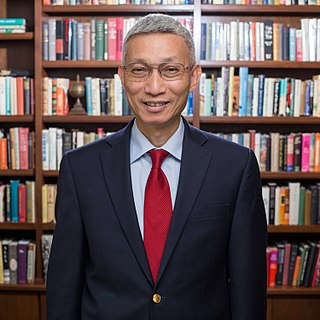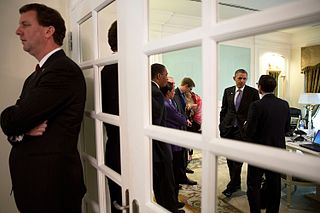Related Research Articles

The Taiwan Relations Act is an act of the United States Congress. Since the formal recognition of the People's Republic of China, the Act has defined the officially substantial but non-diplomatic relations between the US and Taiwan.

Japan is a middle power and a member of numerous international organizations, including the United Nations, the OECD, and the Group of Seven. Although it has renounced its right to declare war, the country maintains Self-Defense Forces that rank as one of the world's strongest militaries. After World War II, Japan experienced record growth in an economic miracle, becoming the second-largest economy in the world by 1990. As of 2021, the country's economy is the third-largest by nominal GDP and the fourth-largest by PPP.
Kenneth Guy Lieberthal is an American professor and politician known as an expert on China's elite politics, political economy, domestic and foreign policy decision making, and on the evolution of US-China relations.

The United States foreign policy toward the People's Republic of China originated during the Cold War. At that time, the U.S. had a containment policy against communist states. The leaked Pentagon Papers indicated the efforts by the U.S. to contain China through military actions undertaken in the Vietnam War. The containment policy centered around an island chain strategy. President Richard Nixon's China rapprochement signaled a shift in focus to gain leverage in containing the Soviet Union. Formal diplomatic ties between the U.S. and China were established in 1979, and with normalized trade relations since 2000, the U.S. and China have been linked by closer economic ties and more cordial relations. In his first term as U.S. president, Barack Obama said, "We want China to succeed and prosper. It's good for the United States if China continues on the path of development that it's on".
Robert L. Suettinger is an American international relations scholar currently serving as a senior advisor at The Stimson Center and an advisor to the Inter-Parliamentary Alliance on China (IPAC). He was national intelligence officer for East Asia at the National Intelligence Council (NIC) from 1997 to 1998 during the Clinton administration. While there, he oversaw the preparation of national intelligence estimates for the director of the Central Intelligence Agency. His areas of specialty are the People's Republic of China and the North Korean nuclear weapons program.

China–Japan relations or Sino-Japanese relations are the bilateral relations between China and Japan. The countries are geographically separated by the East China Sea. Japan has been strongly influenced throughout its history by China, especially by the East and Southeast through the gradual process of Sinicization with its language, architecture, culture, cuisine, religion, philosophy, and law. When Japan was forced to open trade relations with the West after the Perry Expedition in the mid-19th century, Japan plunged itself through an active process of Westernization during the Meiji Restoration in 1868 and began viewing China under the Qing dynasty as an antiquated civilization unable to defend itself against foreign forces—in part due to the First and Second Opium Wars along with the Eight-Nation Alliance's involvement in suppressing the Boxer Rebellion. Japan eventually took advantage of such weaknesses by invading China, including the First Sino-Japanese War and the Second Sino-Japanese War.

Yan Xuetong is a Chinese political scientist and serves as a distinguished professor and dean of the Institute of International Relations at Tsinghua University. Yan is one of the major Chinese figures in the study of international relations (IR). He is the founder of 'moral realism', a neoclassical realist theoretical paradigm in IR theory. His moral realist theory is based on political determinism.

Michael Paul Pillsbury is a foreign policy strategist, author, and former public official in the United States. He is a senior fellow for China strategy at The Heritage Foundation and has been Director of the Center on Chinese Strategy at the Hudson Institute in Washington, D.C. since 2014. Before Hudson, he held various postings in the U.S. Department of Defense and U.S. Senate. He has been called a "China-hawk", and an "architect" of Trump's policy towards China. In 2018, he was described by Donald Trump as the leading authority on the country.

The 11th Bureauof the Ministry of State Security, outwardly known as the China Institutes of Contemporary International Relations under an arrangement called "one institution with two names", is a set of research institutes operated by the Chinese Ministry of State Security (MSS) as a front to influence foreign diplomats and academics and collect intelligence. Located in Beijing, CICIR is operated by senior MSS officers. A 2009 report from the CIA's Open Source Center concluded that CICIR resembles a "Soviet-style intelligence organ" whose principle intelligence customer is the Foreign Affairs Leading Group. CICIR is overseen by the Central Committee of the Chinese Communist Party.

Minxin Pei is a Chinese-American political scientist and opinion columnist, who is the editor of the China Leadership Monitor. He is a specialist on governance in China, U.S.–East Asia relations, as well as democratization in developing nations. He is currently the Tom and Margot Pritzker '72 Professor of Government and George R. Roberts Fellow at Claremont McKenna College and a non-resident senior fellow in the Asia program at the German Marshall Fund of the United States. He was formerly a senior associate in the Asia Program at the Carnegie Endowment for International Peace.
Paul Thomas Haenle is an American analyst and China specialist currently serving as Maurice R. Greenberg Director’s Chair at the Carnegie Endowment for International Peace.

Suisheng Zhao is a professor of Chinese politics and foreign policy at the University of Denver's Josef Korbel School of International Studies. He serves as director of the school's Center for China–US Cooperation, and is the founding editor and the editor-in-chief of the multidisciplinary Journal of Contemporary China.

Yasuhiro Matsuda is a Japanese professor of international politics at the University of Tokyo.

The People's Liberation Army Strategic Support Force is the space, cyber, political, and electronic warfare force and the 5th branch of the People's Liberation Army (PLA). It was established in December 2015 as part of the first wave of the Chinese military reforms.
Philosophy in Taiwan is the set of philosophical traditions in Taiwan, while Taiwanese philosophy is taken to mean philosophical work from the country. Philosophical thought in Taiwan is diverse, drawing influence from Chinese philosophy during Qing rule from the 17th and 18th century, and Western philosophy through the Kyoto School during Japanese rule in the 19th and early 20th century. Taiwanese philosophy took a more endogenous turn during the modern era, with burgeoning philosophical debate regarding Taiwanese Gemeinschaft.
Gregory J. Moore is an American political scientist specializing in international relations, international security and Chinese politics and foreign policy. He is currently Stanton Fellow at the U.S. Air Force Academy in Colorado Springs, CO. Prior to that he was a professor of global studies and politics at Colorado Christian University, and taught political science and international relations at universities in China such as Zhejiang University and University of Nottingham Ningbo for roughly a decade.
International Journal of Taiwan Studies (IJTS) is a hybrid open access biannual peer-reviewed academic journal in English hosting by the Centre of Taiwan Studies, School of Oriental and African Studies (SOAS), University of London. This journal covers all aspects of Taiwan Studies, including social sciences, Taiwanese art, Taiwanese literature, culture of Taiwan, history of Taiwan and humanities, and interdisciplinary topics. It is published by Brill Publishers and cosponsored by Academia Sinica and the European Association of Taiwan Studies. Its Editor-in-Chief is Ming-Yeh Rawnsley. It is established in 2018 and abstracted and indexed by Scopus.

Ian M. Easton is an American security policy analyst currently serving as an associate professor at the U.S. Naval War College's China Maritime Studies Institute. He formerly was a senior director and research fellow at the Project 2049 Institute.

Evan S. Medeiros is an American political scientist and writer currently serving as the Penner Family Chair in Asia Studies in the Walsh School of Foreign Service and the Cling Family Distinguished Fellow in U.S.-China Studies at Georgetown University. He is also a senior advisor at The Asia Group, a senior fellow on foreign policy at the Asia Society Policy Institute's Center for China Analysis, a non-resident senior fellow in the Carnegie Endowment for International Peace's Asia Program, a member of the National Committee on U.S.-China Relations' board of directors, a member of the International Advisory Board of Cambridge University's Centre for Geopolitics, a Life Member of the Council on Foreign Relations, and a board member of Blackberry Government Solutions.
The China Threat Theory is an argument that the People's Republic of China poses a serious threat to democracy, peace, military, economic, and other aspects around the world. As China's economy continues to grow, some believe that China's government system and development model are more effective than those of Europe and the United States and that China will eventually replace them. Since the end of the Cold War, the China threat theory has grown in the West, especially the United States, and has affected the US' foreign policy toward the People's Republic of China.
References
- 1 2 3 Michael D. Swaine, Senior Associate, Asia Program, Carnegie Endowment for International Peace, Expert Biography, archived from the original on 2011-01-10
- ↑ "China Leadership Monitor Contributors | Hoover Institution". Archived from the original on 2010-12-31. Retrieved 2011-01-05.
- ↑ Zhang Zhixin (January–February 2008). "Young American China Watchers' Views on China". Contemporary International Relations. China Institutes of Contemporary International Relations. 18 (1). Archived from the original on 2011-10-04.
- ↑ Steven M. Goldstein (March 2008). "Book Review: Managing Sino-American Crises: Case Studies and Analysis" (PDF). The China Quarterly (193): 172–3.
- ↑ "總統接見「2010年中共解放軍研究國際學術研討會」與會國際學者專家".
- ↑ "中央網路報-兩岸交流". www.cdnews.com.tw.